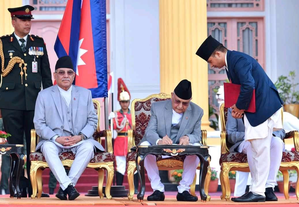
Kathmandu: Nepal’s President Ram Chandra Poudel on Thursday reassured that efforts are underway to resolve the country’s tense political situation within the framework of the Constitution, following the Gen-Z protest movement that led to the ouster of Prime Minister K.P. Sharma Oli.
“In these difficult times, I am engaged in discussions and making every possible effort to find a solution within the constitutional framework. Our priority is to provide a way forward for the nation, safeguard democracy, and maintain peace and order,” President Poudel said in a statement.
He appealed for calm, urging all sides to trust ongoing efforts to address the demands of Gen-Z protesters while ensuring peace and order.
The President’s remarks come amid growing concerns from political parties, leaders, and civil society that any deviation from the constitutional process could endanger democracy. Currently, Gen-Z leaders are in talks with the Nepal Army, which has imposed a curfew in the Kathmandu Valley until Friday morning after assuming responsibility for law and order.
While the Army is leading negotiations, President Poudel emphasized that he remains in charge, noting that the constitution designates him as the ceremonial Commander-in-Chief. Meanwhile, some groups continue street protests demanding democracy be preserved and rejecting any possibility of military rule.
Debate Over Interim Leadership
Former Chief Justice Sushila Karki remains the frontrunner to head the interim government, with Kathmandu Mayor Balen Shah backing her candidacy. However, some Gen-Z leaders argue that the constitution disqualifies former Chief Justices from government roles and have instead suggested Kulman Ghising, former Managing Director of Nepal Electricity Authority, credited with ending the country’s chronic power outages.
Political Parties Push for Constitutional Solutions
Nepal’s major political parties are united in insisting that the constitutional course must be followed. The Communist Party of Nepal (UML), led by the deposed Oli, called on President Poudel to begin “meaningful dialogue” in line with the Constitution. Similarly, the Maoist Centre, led by Pushpa Kamal Dahal, stressed that bypassing constitutional processes would amount to regression.
Nepali Congress leaders Gagan Thapa and Bishow Prakash Sharma also warned against extra-constitutional actions. “Lawlessness will only invite further chaos. Every effort must ensure legal and constitutional continuity to avoid a dangerous power vacuum,” they said.
Madhes-based parties echoed the same sentiment, emphasizing that federalism, republicanism, and inclusivity—achieved through years of struggle—must not be undermined.
Civil Society Concerns
The civil society group Brihat Nagarik Andolan voiced alarm over the Army’s role, accusing it of negotiating with groups that infiltrated the Gen-Z protests and orchestrated organized violence targeting state institutions, the economy, and private property.
As uncertainty lingers, calls continue to mount for solutions firmly rooted in the Constitution to safeguard Nepal’s democratic achievements.
With inputs from IANS